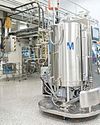Try GOLD - Free
From Haematologic to Autoimmune DiseaseThe CAR-T Therapy Second Revolution
BioSpectrum Asia
|BioSpectrum Asia May2024
Cell and gene therapies have revolutionised the field of medicine, offering new treatment options for patients with various diseases that, by type of disease or severity, were considered untreatable until a few years ago. Rapid technological advancements in genetic and biological engineering and improvements in the quality and standardisation of the manufacturing process are fostering a marked increase in clinical development of these advanced therapies, generally named cell and gene therapies CGT), and they are expected to receive more approvals in the near future.
-

The Alliance for Regenerative Medicine reported in its January 2024 meeting that, up to 17 regulatory approvals in the U.S. and Europe are anticipated for the coming year in cell & gene therapies, compared to eight approvals in 2023. This is despite the impact & changes in priorities caused by COVID-19. In the CGT field, chimeric antigen receptordirected (CAR-T) cell therapies have emerged as a groundbreaking approach for treating patients with cancers that previously had proved to be resistant to available conventional therapies. Specifically, CAR-T cell therapies targeted against antigens expressed on B cells (CD19 and BCMA) have been successful in treating blood-related cancers. Now we are seeing early promising results in expanding CAR-T application to autoimmune diseases, providing new hope for patients suffering from these debilitating conditions.
Evolution and Medications Approved to Date
CAR-T therapy has come a long way since its inception, with significant advancements in design, manufacturing and clinical applications. The first CAR-T therapy approved by the U.S. Food and Drug Administration (FDA) in 2017, Novartis’s Kymriah, targeted CD19-positive B cell malignancies, such as acute lymphoblastic leukemia and non-Hodgkin lymphoma. Since then, five more CAR-T therapies targeting CD19 and BCMA antigens (Tecartus, Abecma, Yescarta, Breyanzi and Carvykti) have been approved. To date, across all six FDA-approved CAR-T therapies, drugmakers have reported treating about 34,400 patients worldwide, and these therapies have demonstrated remarkable efficacy, with durable remissions in patients who have exhausted other treatment options. The success of CAR-T therapy in hematologic diseases has sparked interest in exploring its potential in treating other indications.
This story is from the BioSpectrum Asia May2024 edition of BioSpectrum Asia.
Subscribe to Magzter GOLD to access thousands of curated premium stories, and 10,000+ magazines and newspapers.
Already a subscriber? Sign In
MORE STORIES FROM BioSpectrum Asia

BioSpectrum Asia
"The next 5-years will see mRNA science evolve beyond infectious disease"
A new survey from Moderna Singapore reveals persistent vaccine hesitancy among older adults in Singapore, even as international travel and year-end gatherings increase the urgency of protection. The findings point to clear opportunities to strengthen public health, including empowering healthcare professionals as trusted messengers and promoting co-administration of vaccines.
4 mins
BioSpectrum Asia Dec 2025
BioSpectrum Asia
No Funding No Vax for TB?
The World Health Organization (WHO)'s latest updates on tuberculosis (TB) released on November 12 reveal significant progress in diagnosis, treatment, and political commitment, but also expose deep vulnerabilities—especially in the South-East Asia Region (SEARO)—related to funding gaps and the uncertain future of novel TB vaccines. SEARO remains the global epicentre of the TB epidemic, carrying more than 45 per cent of the world's TB incidence despite representing only a quarter of the global population.
2 mins
BioSpectrum Asia Dec 2025

BioSpectrum Asia
Australia builds tailored heart pump to transform heart failure care
Despite making up half of the 64 million people living with heart failure, patients with this common form have no access to heart pump treatments and are left with only medication or palliative care.
1 min
BioSpectrum Asia Dec 2025

BioSpectrum Asia
Clinical Research Trends 2026: Hybrid DCTs Set for Surge as Innovation Outpaces Regulatory Hurdles
APAC's openness to innovation, combined with its large population and low trial density, creates strong potential for expanding decentralised clinical trials (DCTs), especially for patients with limited trial access. While regulatory diversity and operational challenges will continue to hinder fully decentralised models, the region is expected to adopt more digital technologies in clinical research. As a result, hybrid DCTs will keep gaining traction, and effective management of digitally collected data will remain a central focus for data science teams.
4 mins
BioSpectrum Asia Dec 2025

BioSpectrum Asia
CSL Seqirus to localise advanced influenza vaccine manufacturing in Saudi Arabia
Australia-based CSL Seqirus and Vaccine Industrial Company have signed a Memorandum of Understanding with the Ministry of Health of Saudi Arabia to enhance the biotechnology sector by accessing advanced cellbased seasonal and pandemic influenza vaccines and localising manufacturing in Saudi Arabia.
1 min
BioSpectrum Asia Dec 2025

BioSpectrum Asia
How Sponsors Could Gain Advantage by Embracing Dose Optimisation in Asia by 2026
In 2026, oncology drug development in Asia may move away from the historical maximum tolerated dose (MTD) paradigm toward evidence-based dose optimisation. Sponsors might consider adopting strategies similar to the FDA's Project Optimus, which emphasises selecting doses that balance efficacy and safety rather than relying solely on toxicity thresholds. Doing so could improve patient outcomes and position companies favourably as regulatory expectations evolve.
1 mins
BioSpectrum Asia Dec 2025

BioSpectrum Asia
Fujifilm launches joint research with National Cancer Center in Japan
Fujifilm Corporation has signed a joint research agreement with the National Cancer Center Japan, a Tokyo-based national institution recognised for its leadership in cancer care and research.
1 min
BioSpectrum Asia Dec 2025

BioSpectrum Asia
Monash spinout RAGE Biotech secures $29 M to advance next-generation RNA therapeutics
Australia's Monash University spinout RAGE Biotech has raised $29 million in Series A funding, marking a major step toward translating RNA-based therapeutics for chronic inflammatory disease into the clinic.
1 min
BioSpectrum Asia Dec 2025

BioSpectrum Asia
Submitting clinical data to the FDA and PDMA: An efficient and compliant approach
In both the US and Japan, regulators provide an extensive set of resources detailing the rules and specifications governing submissions for marketing approval of new drugs and biologics. Fortunately, despite some differences, the regulations concerning clinical data have a surprising amount in common. It is possible that with a solid understanding of the requirements and an adherence to best practices, sponsors can develop some of the same material for submission to both countries.
2 mins
BioSpectrum Asia Dec 2025

BioSpectrum Asia
Regenerative medicines and microbiome health are emerging as exciting frontiers, with Australian companies and researchers pushing into new therapeutic approaches
After more than a year at the helm of AusBiotech, CEO Rebekah Cassidy reflects on her early priorities and the organisation’s ambitions as Australia accelerates its position in the global life sciences economy. In an email interaction on the sidelines of AusBiotech 2025, she highlights the country's progress in mRNA, cell and gene therapy, and radiopharmaceuticals, outlines emerging areas of momentum, and discusses how new partnerships and MoUs are strengthening collaboration across the biotech ecosystem. Rebekah also outlines how AusBiotech is preparing Australia for a more competitive and connected global life sciences economy and the strategic priorities shaping AusBiotech’s next chapter. Edited excerpts:
7 mins
BioSpectrum Asia Dec 2025
Listen
Translate
Change font size
